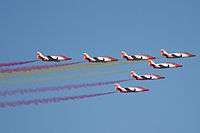Fiesta Nacional de España
| Fiesta Nacional de España | |
|---|---|
 Aerial parade by the Patrulla Águila | |
| Observed by | Spain |
| Date | October 12 |
| Frequency | annual |
The Fiesta Nacional de España (Festa Nacional d'Espanya in Catalan/Valencian/Balearic; Festa Nacional de España in Galician; Espainiako Jai Nazionala in Basque) is the national day of Spain. It is held annually on October 12 and is a national holiday. It commemorates the anniversary of Christopher Columbus's first arrival in the Americas, a day also celebrated in other countries.
History
The anniversary of Columbus' landing in the New World on October 12, 1492, is widely celebrated throughout the Americas. It is known as Columbus Day in the United States and as Día de la Raza in various Latin American countries. Celebration of the anniversary in Spain dates to 1935, when the first festival was held in Madrid.[1] The day was known as Día de la Hispanidad, emphasizing Spain's connection to the Hispanidad, the international Hispanic community.[2] On November 27, 1981, a royal decree established Día de la Hispanidad as a national holiday.[2]
However, on October 7, 1987, the name was changed to Fiesta Nacional, and October 12 became one of two national celebrations, along with Constitution Day on December 6.[2][3] Spain's "national day" had moved around several times during the various regime changes of the 20th century; establishing it on the day of the international Columbus celebration was part of a compromise between conservatives, who wanted to emphasize the status of the monarchy and Spain's history, and Republicans, who wanted to commemorate Spain's burgeoning democracy with an official holiday.[3] The change in name had the effect of removing all reference to Spain's historical colonialism, and even its ties to Latin America.[4]
Ever since 2000, October 12 Is celebrated each year with a military parade.[3] To commemorate it, there is a military parade (usually held in Madrid) and presided over by the Spanish king, who is the head of state, since Spain is politically organized as a constitutional monarchy. The Prime Minister of Spain (Presidente del Gobierno) has also a special role in the ceremony, only second to that of the king. Then a wide array of authorities, including the ministers of the government, leaders of parliament and others ranging from foreign diplomats deployed in Spain to members of the autonomous governments, are invited to attend the parade performed by the Spanish Armed Forces, which typically features a display by the Spanish Air Force's aerobatics team, the Patrulla Águila. Other than this, however, the holiday is not widely or enthusiastically celebrated in Spain; there are no other large-scale patriotic parades, marches, or other events, save in regional capitals, and the observation is generally overshadowed by the feast day of Our Lady of the Pillar, the patroness of Spain's Civil Guard, whose feast day falls on this date.[3]
 Dignitaries attending the military parade, 1988
Dignitaries attending the military parade, 1988 Stand of dignitaries in the military parade, 2008
Stand of dignitaries in the military parade, 2008 Army tank on parade in Madrid, 2009
Army tank on parade in Madrid, 2009 Air Force parade, 2013
Air Force parade, 2013- Eternal flame
See also
References
- ↑ ""Día de la Hispanidad"/"Fiesta de la Hispanidad"". filosofia.org (in Spanish). 2004. Retrieved September 11, 2011.
- 1 2 3 Prakke, L.; C. A. J. M. Kortmann; J. C. E. van den Brandhof (2004). Constitutional Law of 15 EU Member States. Kluwer. p. 748. ISBN 90-13-01255-8. Retrieved September 30, 2009.
- 1 2 3 4 Molina A. de Cienfuegos, Ignacio; Martínez Bárcena, Jorge; Fuller, Linda K. (Ed.) (2004). "Spain: National Days throughout the History and the Geography of Spain". National Days/National Ways: Historical, Political, and Religious Celebrations around the World: 253. ISBN 978-0-275-97270-7. Retrieved September 30, 2009.
- ↑ Encarnación, Omar Guillermo (2008). Spanish Politics: Democracy after Dictatorship. Polity. p. 43. ISBN 0-7456-3992-5. Retrieved April 19, 2011.